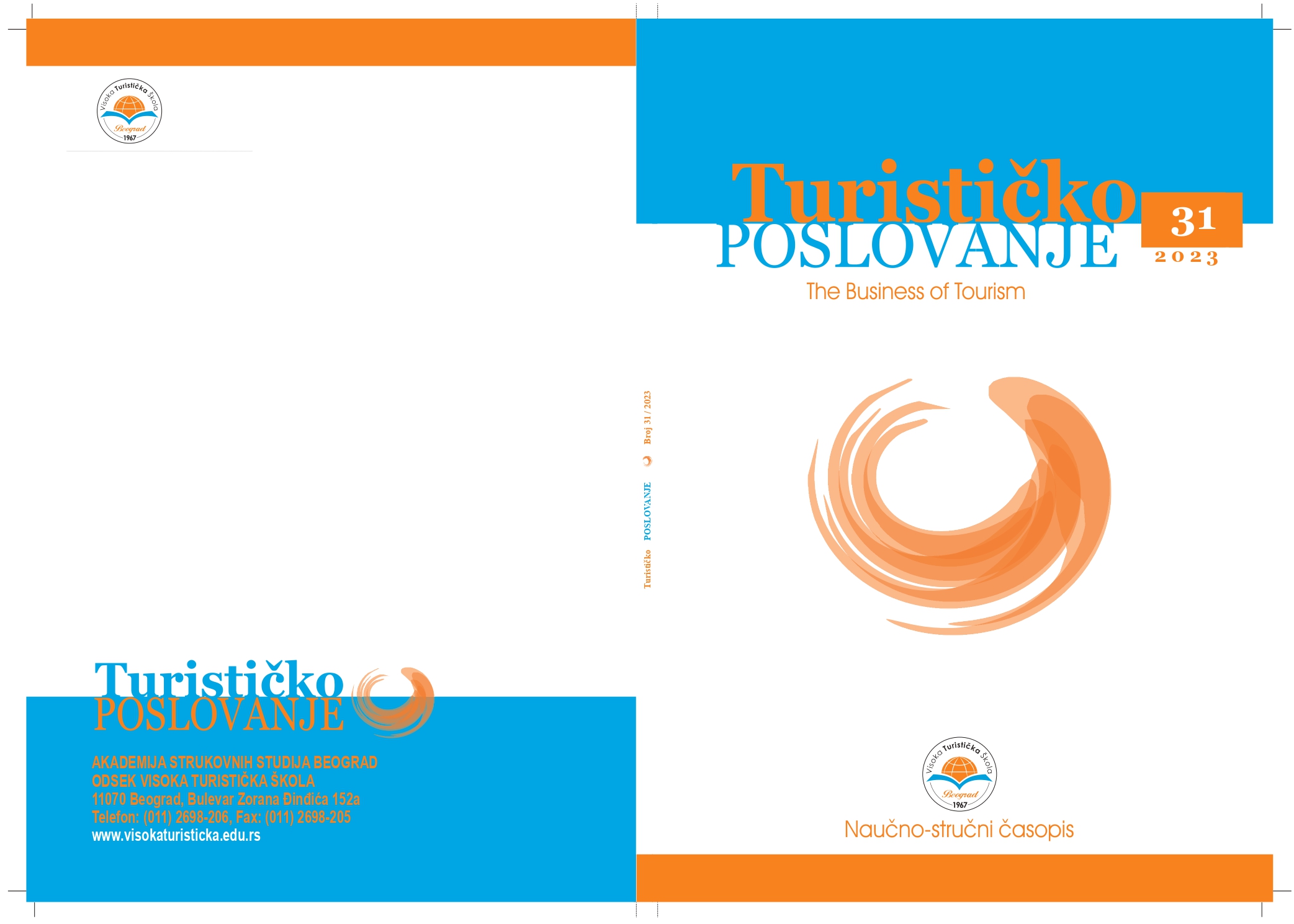UPRAVLJANJE HRANOM I PIĆEM U HOTELIMA: IZAZOVI, MOGUĆNOSTI I NAJBOLJE PRAKSE
Sažetak
Ovaj rad istražuje različite aspekte upravljanja hranom i pićem u hotelima i naglašava značajnu ulogu koju ova oblast igra u hotelskom poslovanju. Ovaj rad daje pregled literature objavljene od 2013. godine, fokusirajući se na primenu najnovijih pristupa u upravljanju hranom i pićem u hotelima uopšte. Komparativna analiza je korišćena da bi se stekao bolji uvid u upravljanjem hranom i pićem u različitim hotelima. U radu će biti analizirani ključni trendovi u oblasti upravljanja hranom i pićem u hotelima i istražiti kako primena novih tehnologija i pristupa može uticati na efikasnost i profitabilnost poslovanja.
Reference
Abd Aziz, N. A., Ramdan, M. R., Nik Hussin, N. S., Abdul Aziz, Z., Osman, J., & Hasbollah, H. R. (2021). The Determinants of Global Expansion: A Study on Food and Beverage Franchisors in Malaysia. Sustainability, 13(18), 10328.
Amin, M., Yahya, Z., Ismayatim, W. F. A., Nasharuddin, S. Z., & Kassim, E. (2013). Service quality dimension and customer satisfaction: An empirical study in the Malaysian hotel industry. Services Marketing Quarterly, 34(2), 115-125.
Baloglu, S., & Mangaloglu, M. (2015). An analysis of studies on environmentally sustainable tourism: A systematic review. Journal of Hospitality and Tourism Management, 22, 1-10.
Cheong, Y. S., Seah, C. S., Loh, Y. X., & Loh, L. H. (2021). Artificial Intelligence (AI) in the food and beverage industry improves the customer experience. In 2021 2nd International Conference on Artificial Intelligence and Data Sciences (AiDAS) (pp. 1-6). IEEE.
Cho, M., & Olsen, M. (2013). Hotel foodservice managers' perspectives on sustainable practices. Journal of Hospitality and Tourism Research, 37(4), 508-526.
Chriqui, J. F., Pickel, M., & Story, M. (2014). Influence of school competitive food and beverage policies on obesity, consumption, and availability: a systematic review. JAMA pediatrics, 168(3), 279-286.
Galloway, D., & Parkinson, J. (2014). Food and Beverage Management (5th ed.). Oxford: Elsevier.
Hsu, C. H. C., & Shen, Y. C. (2016). A study of food and beverage cost control in the hotel industry. Journal of Hospitality and Tourism Research, 40(3), 259-278.
Kim, S. H., & Lee, T. J. (2017). Investigating the influence of experiential quality, customer satisfaction, and customer loyalty on the relationship between food and beverage attributes and hotel brand equity. Journal of Hospitality Marketing & Management, 26(8), 893-912.
Kostić-Stanković, M. (2015). Food and beverage management in hotels: A case study from Serbia. UTMS Journal of Economics, 6(1), 73-81.
Krsmanović, B., & Djurić, V. (2019). Influence of food and beverage service quality on guest satisfaction in hotels in Serbia. Journal of Foodservice Business Research, 22(3), 211-228.
Li, H., Ye, Q., & Law, R. (2013). Determinants of customer satisfaction in the hotel industry: An application of online review analysis. Asia Pacific Journal of Tourism Research, 18(7), 784-802.
Lin, P. M., Tung, V. W. S., Qiu Zhang, H., & Gu, Q. (2018). Tourist experience on memorable hospitality services. Journal of China Tourism Research, 14(2), 123-145.
Marković, S., Todorović, M., & Djokić, M. (2015). Analysis of food and beverage sector in Serbia in the function of competitiveness. Economic of Agriculture, 62(1), 79-90.
Niu, B., Xie, F., Mu, Z., & Ji, P. (2020). Multinational firms’ local sourcing strategies considering unreliable supply and environmental sustainability. Resources, Conservation and Recycling, 155, 104648.
Piboonrungroj, P., & Disney, S. M. (2015). Supply chain collaboration in tourism: a transaction cost economics analysis. International Journal of Supply Chain Management, 4(3), 25-31.
Ramli, A. A., Anuar, F. L. M. K., Rosli, I., & Jamalidan, S. A. (2018). The Relationship of Design, Implementation, Monitoring and Evaluation in Training and Development towards Employee Performance in Food and Beverage Industry. Global Business & Management Research, 10(3).
Sisson, L. G., & Adams, A. R. (2013). Essential hospitality management competencies: The importance of soft skills. Journal of Hospitality & Tourism Education, 25(3), 131-145.
Srecković, M., & Djurić, V. (2018). Measuring the efficiency of food and beverage departments in Serbian hotels. Tourism & Hospitality Management, 24(1), 53-65.
Vandenbrink, D., Pauzé, E., & Potvin Kent, M. (2020). Strategies used by the Canadian food and beverage industry to influence food and nutrition policies. International Journal of Behavioral Nutrition and Physical Activity, 17(1), 1-13.
Wang, Y. F., Chen, S. P., Lee, Y. C., & Tsai, C. T. S. (2013). Developing green management standards for restaurants: An application of green supply chain management. International journal of Hospitality management, 34, 263-273.
Xu, X., & Li, Y. (2016). The antecedents of customer satisfaction and dissatisfaction toward various types of hotels: A text mining approach. International journal of hospitality management, 55, 57-69.
Yoo, J. J., & Park, H. J. (2014). Investigating customer satisfaction and loyalty in the hotel industry: The role of food and beverage quality. Journal of Travel & Tourism Marketing, 31(1), 82-96.
Zrnić, M. (2020). Study on the importance of food traceability in the tourism industry. Turističko poslovanje, (25-26), 17-25.
Zrnić, M., Gajić, T., Vukolić, D., & Čavić, S. (2022). Managing and minimizing food waste in the hospitality industry. Hotel Link. (2). 73-79.

